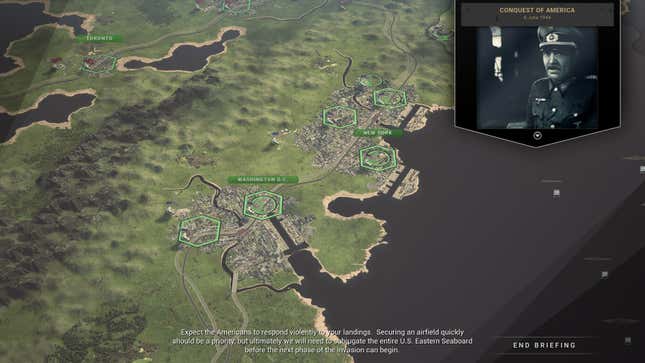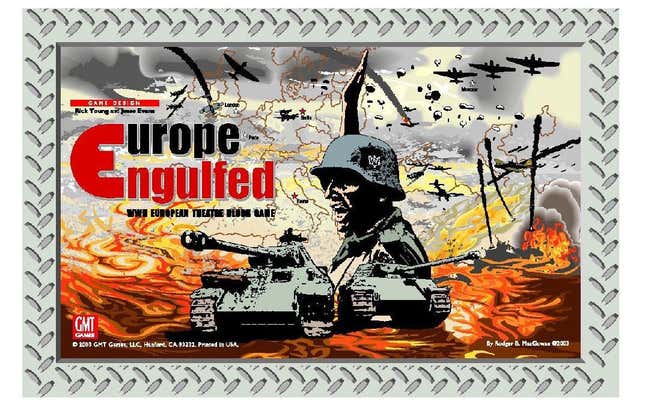
I’m playing Slitherine’s Panzer Corps 2 at the moment and loving almost every minute of it. It’s one of the best turn-based strategy games in years, but there’s also something a bit off about it, something that’s troubling about a lot of historical strategy games: It has a little too much fun playing the Germans.
Panzer Corps 2, from its jovial mission briefings to its semi-fictional version of history, takes an almost gleeful approach to Germany’s participation in the war. The sweeping advances of its early campaigns, the scale and variety of operations it drops you into, the way Poland’s tragic occupation is forever a mere tutorial for WW2 strategy games: Nazi Germany’s attempted conquest of an entire continent is viewed in this game as a mere gameplay and level design opportunity.
Each of these victories is seen as a conquest of land, a map painted black, a mission carried out successfully. The further and further you drift from actual world history, as this game will do the further you get into it, the more excited the mission briefings (and strategic aims) get. Gee wiz, Herr General, those Brits sure put up a fight! Now let’s go get the Russians! Then zee Americans!

Which is fine if we were playing some fictional faction in Westwood’s Dune II, Dawn of War or even the pulpy Red Alert, but at its heart, this isn’t some abstract and artificial war. We are still living in the shadow of this conflict 75 years later, from international power structures to the resurgence of terror groups espousing (and committing atrocities in the name of) Nazi views.
I shouldn’t need to, and so won’t get into just why the Nazis were so bad, but suffice to say the least we should be expecting from developers allowing us to play as them is a little introspection. These are some of history’s greatest villains, and yet here were are, time and again leading them through foreign lands, knee-slapping with our fellow officers as we lay waste to cities and enslave millions, damning them to a conveniently unseen life of brutality and displacement.
I don’t want to pick on Panzer Corps 2 specifically here, because it’s something countless strategy games, simulations, and tabletop wargames have done for decades. From box art to promo images to campaign design, you don’t have to look far in historical circles to see that German weapons, vehicles, and infantry are very often the stars of the show.

There’s a fascination with the German armed forces in 1939-1945 that has its claws in deep in communities like this, not necessarily (or at least primarily) for their political views, but also for more superficial reasons. Let’s be real: The Nazis had cool uniforms. Cool tanks, cool weapons, cool aircraft, zany secret weapons. If you’re playing a game where you need to assume the role of a faction, and one of those were the guys with the slick grey uniforms and badass tanks, a lotta folks will choose the Germans!
Then there’s the matter, as Rob Zacny put it so well in his Vice story last year, of situation. The Germans had all that cool gear, and all those early victories, yet the Germans also ultimately lost the war to a bunch of nations with enormously superior amounts of resources, equipment and manpower.
This creates a scenario, one that games like Panzer Corps 2 are more than happy to exploit, where the player can imagine that it was German leadership that lost the war, not the fact it picked a fight with almost the entire industrialized world, and that you, with your galactic brain and 80 years of hindsight, can do a better job.
That better job being the acquisition of more land that a German flag would fly over. A global victory for forces of totalitarianism and genocide. The death squads, the concentration camps, the gas chambers, the mass displacement, everything that would come along under that flag is rarely, if ever mentioned in historical wargames and strategy titles, lest it undermine your heroic achievements.
At best, this is historical negligence, pretending some of history’s worst atrocities weren’t committed (or would even be expanded) in the name of letting players enjoy a sanitized vision of gentlemanly conquest. At worst...look, Order of Battle lets you directly command the Waffen SS, and at a time when literal Nazis are an ever-increasing threat across the Western world. That is not a good look.
Here’s what really gets me about this fascination with Germans, though, beyond the moral quagmire: It shows a complete lack of imagination! There are so many variables in the Second World War beyond “what if the Nazis won?” and yet you’ll rarely find any of these explored in a historical strategy game.
One of the reasons I find Hearts of Iron IV so fascinating is that it’s able to, and genuinely takes heart in, exploring the literally endless ways the war could have turned out differently, and doesn’t have as its default position players taking on the role of a genocidal death cult’s spearhead.
What if the French, the largest land army in the world in 1939, had invaded Germany and ended the war in months? What would that 1940 have looked like, with a dominant France (and their own very cool tanks) suddenly left face-to-face with Stalin’s emergent Soviet Union? Who knows, but it’d be fun to find out, and Hearts of Iron IV (and some of its most popular mods) let us find out!
I’ll acknowledge here that the original Panzer General (and Panzer Corps, too), despite their base campaigns leading players on a Nazi war-winning odyssey, would later release expansions or alternative versions presenting the war from the perspective of the Allied forces. Some of these, like Allied Corps’ finale, even present fictional outcomes of their own, like a clash between the USSR and US/British forces that emerges out of the chaotic final days of Germany’s collapse.
But those takes always come second, or later. A game called Panzer Corps is making a very conscious decision when it comes to which foot it’s leading off on. Of all the factions and stories it and so many other strategy games could tell, it’s the German one so many developers and designers continue to go to first.
I’m taking particular aim at strategy games here, while acknowledging that shooters have their own issues. While single-player games (Call of Duty, Medal of Honor, Battlefield) are usually played from the Allied side (rare and often fumbled examples excepted), in multiplayer all bets are off and everyone is free to pick a Nazi and run around shooting whoever they want.
But the immediate scale of shooters also renders this a far more superficial affair than the wider scope of a strategy game. It’s one thing to run around a city street firing off MP40 rounds to win a scored match, divorced from any kind of wider strategic context, and another thing entirely to overrun the largest cities in the Soviet Union and doom their inhabitants to unspeakable horrors.
Something that’s odd about this widespread refusal to acknowledge Nazi atrocities is that when it comes to another popular subject matter of Second World War games, the USSR, developers have much less trouble with a more nuanced approach. Company of Heroes 2, for example, was played from a Russian perspective, but it didn’t shy away from depicting the Soviet Union’s own horrors.
And I can’t write something like this without bringing up the fact that I’ve played plenty of strategy games and flight sims over the years that took a very clinical view of Allied bombing campaigns that are now viewed as essentially war crimes.
I’m not saying stop letting us play as Germany in strategy games. All strategy games have to accommodate some degree of turning a historical blind eye. Otherwise, series like Civilization, which has let us play as everyone from Genghis Khan to Stalin, wouldn’t even exist.
As I’ve said, there are unique challenges presented by each faction’s situation and capabilities in the Second World War, and to let us play as some nations but exclude Germany, the instigator of the entire European conflict, would be a curious thing to have to dance around.
It would just be nice if, for a change, studios could at least acknowledge the extreme mental gymnastics involved in letting us play as Germans but not Nazis, and write and design their world-conquering strategy games with this in mind.

